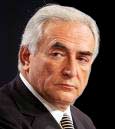Poor countries need $25 billion emergency aid to fight crisis: IMF
04 Mar 2009
The global financial crisis is hitting poor countries, especially in Sub-Saharan Africa, hard, Dominique Strauss-Kahn, managing director of the International Monetary Fund (IMF), said and warned that unless the international community acts urgently and generously, the crisis will have potentially devastating effects on the most vulnerable countries.
 The global financial crisis has shifted to the world's poorest nations IMF said, adding, it has identified 22 countries that may need as much as $25 billion in additional funding in 2009 to cope with the downturn.
The global financial crisis has shifted to the world's poorest nations IMF said, adding, it has identified 22 countries that may need as much as $25 billion in additional funding in 2009 to cope with the downturn.
Based on IMF projections, these 22 countries may need up to $140 billion if global conditions were to deteriorate sharply and a "third wave" of the financial crisis, hits third world consumer economy .
"I foresee mounting problems for developing countries," Strauss-Kahn said. "After hitting first the advanced economies and then the emerging economies, a third wave from the global financial crisis is now hitting the world's poorest and most vulnerable countries," he added.
IMF said the impact of the financial crisis on low-income countries would be disastrous unless they are immediately addressed.
"This puts at risk the major achievements of higher growth, lower poverty, and greater political stability that many low-income countries have made over the past decade. I urge donors to rise to the challenge and provide the financing needed to preserve these hard-won gains and prevent a humanitarian crisis."
He said advanced countries are spending billions on fiscal stimulus and financial sector restructuring, poor countries too need fiscal support. Strauss-Kahn said at least $25 billion would be urgently required to provide concessional finance to these 20 identified countries.
Much more may be needed depending upon the heavy downside risks to the global economic outlook, and the prospect of more countries being affected as the crisis deepens, he said.
"Bilateral donors must ensure that aid flows are scaled up, not trimmed back," Strauss-Kahn said. "At a time when the advanced economies are spending hundreds of billions of dollars on fiscal stimulus and financial sector restructuring, we must find room to help low-income countries," he added.
He warned that lower growth could have serious implications for poverty and potentially also for political stability, adding that spending on targeted social safety net programs should be ramped up to protect the poor. At the same time, it will be critical to protect spending on health, education, and vital infrastructure.
While the IMF plans to double its concessional lending capacity, Strauss-Kahn said it is also looking at ways to make its lending to low-income countries more flexible. "The IMF is mounting an extraordinary response to what is an extraordinary crisis facing the world's poorest economies," he said.
According to IMF:
- Low-income country growth in 2009 is projected at just over 4 per cent -more than 2 percentage points lower than expected a year ago - with risks heavily on the downside. Many of the world's poorest countries will at best see incomes stagnate this year, and possibly even contract.
- The global crisis is squeezing exports of low-income countries severely, while also curtailing inflows of foreign direct investment and remittances, which had become important sources of financing in recent years. Many countries will face sharply lower fiscal revenues and some may also experience pressure on their foreign exchange reserves.
- The IMF analysis identifies 22 low-income countries that face the most acute financing constraints. To keep their external reserves at safe levels (around 3-4 months of imports), at least $25 billion in additional concessional financing is needed in 2009. This represents about 80 per cent of annual aid to all low-income countries in recent years.
If global growth and financing conditions deteriorate further, the number of vulnerable countries could almost double, while additional financing needs could approach $140 billion, he said.
Concessional lending by the IMF has almost doubled to $1.5 billion in 2008 while non-concessional lending to low-income countries has gone up to $4 billion. IMF has significantly stepped up its financial assistance to low-income countries in response to last year's food and fuel price shock.
The IMF is also working with low-income countries on crafting appropriate policy responses to the crisis, and is reinforcing its technical assistance to strengthen economic policymaking in developing countries. The IMF also aims to bolster the role and participation of developing countries in the ongoing policy debate in multilateral policy forums, Strauss Khan said.



















